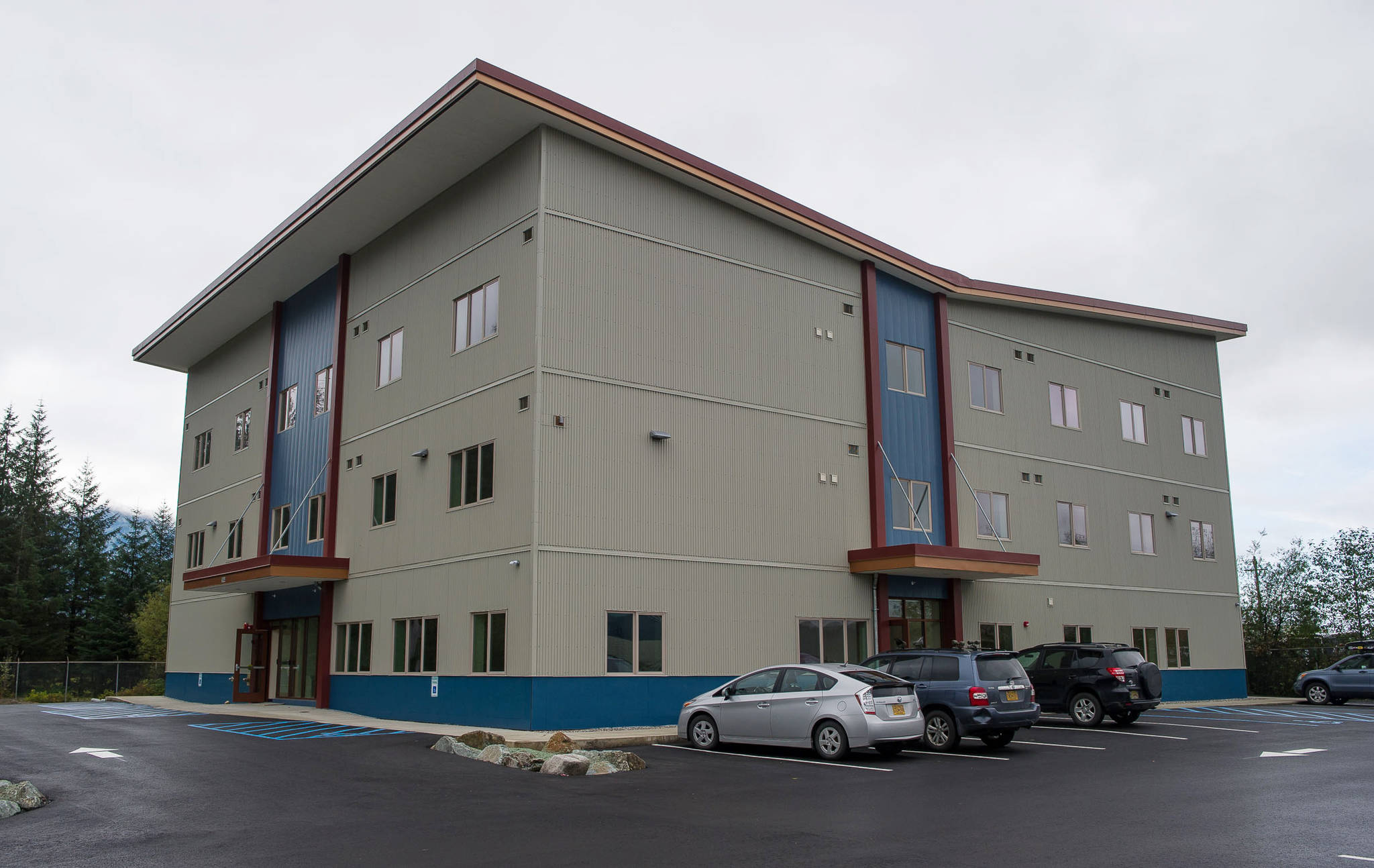Some of Juneau’s most vulnerable residents will have a warm, safe place to live within the week.
The first eight residents of the Housing First supportive housing facility will move in sometime in the next week, multiple board members said Tuesday. The building’s grand opening is today at 11:30 a.m., where members of the public can get a tour of the 32-unit facility located in Lemon Creek geared toward housing homeless alcoholics and inebriates.
Program Director Dacia Davis has worked in social services for 14 years across the state, and said she hasn’t seen anything like this in Alaska.
“I see it as extremely unique,” Davis said, “because it’s really just allowing the tenants to guide their own choices and we as a staff get to show up and be positive supports as much or as little as (the tenants) want.”
[Slideshow: Housing First Opening]
When people move in, they will have access to behavioral health services, medical services, food, laundry and a small library/learning center. Tenants will have total control over their experience, Davis said. If they want to engage with staff members and join in with programs, they can. If not, they have the freedom to just be in their room and go about their business.
Mariya Lovishchuk, the executive director of the Glory Hole homeless shelter, said this Housing First setup is different because of its overarching philosophy.
“The Housing First philosophy says, you basically give people a home first, with no strings attached,” Lovishchuk said. “You do have services available, but you don’t force anybody to participate in services at all. The idea is that just having safe housing, clean housing, nice housing in itself is a stabilizing force in people’s lives.”
The first group of eight individuals moves in within the next week, and Lovishchuk said they hope to move the next group of eight people in just 10-14 days later. Then 10-14 days after that, she hopes to have the third group moved in. The facility will be staffed around the clock with at least two people on duty at all times.
The Juneau Housing First Collaborative (JHFC) selected these 32 individuals based on a vulnerability study, basically a survey of which people in the community were most at-risk. Staff from numerous community organizations interviewed 96 homeless people and put their data into the Alaska Homeless Management Information System, which computes a person’s “vulnerability score.” JHFC then selected the 32 most vulnerable people according to the study and will be moving them in.
Each of the units comes with a kitchen, a bathroom, a table and a bed. On each bed is a quilt personally made for each tenant by a group of volunteers called the Gold Street Quilters, Lovishchuk said. The kitchens are equipped with special stoves and ovens that turn off automatically after 20 minutes. Many of the people coming into Housing First haven’t used kitchen equipment in a very long time, Lovishchuk pointed out, so safety is a priority.
“It’s annoying if you’re trying to make a turkey,” Lovishchuk said of the 20-minute timer, “but it’s great because you can’t start a fire.”
The building’s final price tag was around $8.2 million, the board members said, and the Lovishchuk said one of the reasons it was so pricey is that it is built with a focus on limiting operating costs in the future. Large heat pumps provide heat for the first floor, eliminating the need to burn heating oil. The walls are built to keep heat in, and the heaters in the rooms are mounted high on the wall to cut down on the risk of a fire.
^
A learning experience
The idea is to provide long-term supportive housing for the residents. Lovishchuk said that along with working the residents back to health, one of the goals is to help them find employment and increase their income. Tenants will pay 30 percent of their income as rent, Lovishchuk explained. If a resident makes no money, his or her rent will be zero. If a resident makes, say $1,000 per month, they’ll pay $300.
The University of Alaska Fairbanks will also be conducting a study of the tenants (or at least those who agree to participate). UAF researchers will interview the residents when they move in, asking about the past year of their life. They’ll check in every few months for the ensuing three years, eventually collecting data to evaluate the program and the benefits of the Housing First system, board member Jeannette Lacy said.
UAF researchers won’t be the only ones learning along the way, as Davis said this will be an educational experience for all staff members involved.
“It’s just gonna be a learning curve, for sure, because it is a new project, which is exciting,” Davis said. “We all, as a team, get to make it our own. There’s so much support from the community, which is so amazing and is such a huge asset to this program.”
• Contact reporter Alex McCarthy at 523-2271 or alex.mccarthy@juneauempire.com.

